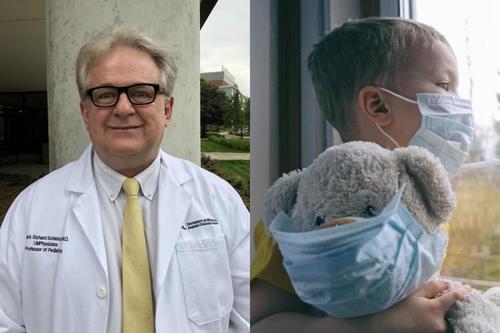
The Centers for Disease Control and Prevention (CDC) says they anticipate that 2020 will be another peak year for cases of acute flaccid myelitis (AFM), an uncommon but serious neurologic condition that affects mostly children, and in some cases, causes permanent paralysis or death. In 2018, Minnesota had 11 cases, which was one of the highest state case rates in the U.S. that year.
This year’s peak of AFM is expected between August and November. Mark R. Schleiss, MD, a professor in the Department of Pediatrics at the University of Minnesota Medical School and pediatric infectious disease physician with M Health Fairview, is available to speak about the early warning signs and symptoms of AFM as well as a newly-funded study of AFM that he co-leads at M Health Fairview University of Minnesota Masonic Children’s Hospital.
Mark R. Schleiss, MD
“AFM, or acute flaccid myelitis, is an uncommon but serious neurologic condition that affects mostly children and can lead to permanent paralysis or even death. Data shows that it peaks about every two years and is caused by enteroviruses, particularly enterovirus-D68 (EV-D68), which are assumed to be responsible for these peaks in cases.”
Early warning signs and symptoms
“AFM can progress rapidly over the course of hours or days and cause serious damage in previously healthy patients, so recognizing the symptoms early and seeking appropriate care is critical.
More than 90% of patients with AFM had a mild respiratory illness or fever consistent with a viral infection before they developed AFM. Other early warning signs include arm or leg weakness and loss of muscle tone and reflexes. Some patients have also experienced difficulty moving the eyes or drooping eyelids, facial drooping or weakness, trouble swallowing or slurred speech, pain in the arms or legs, or pain in the neck or back. More uncommonly, patients may even have numbness or tingling or be unable to pass urine.
The most serious symptoms include respiratory failure, which happens when the muscles involved with breathing become weak and can require a ventilator to help patients breathe. Also, body temperature changes and blood pressure instability could be life-threatening.”
Current status of AFM in the U.S. and in Minnesota
“So far in 2020, the U.S. has had 16 reported cases of AFM, including one in Minnesota. There are also 38 patients under investigation. One of the patients in the U.S. that did contract AFM this year has died, which is the first death from the illness since 2017.”
Handling AFM this year with the COVID-19 pandemic
“It’s not clear yet if social distancing will play a role in halting the spread of the enterovirus, which could mean less AFM cases than expected or a delay in the outbreak. If AFM does spread as expected, it could likely be confused with COVID-19, as one of the first symptoms is a respiratory illness. We encourage all parents to seek immediate medical care for their children at the onset of this symptom.
Also this year, the National Institutes of Health recently funded a study that Dr. Amanda Moen, an assistant professor in the Department of Neurology at the University of Minnesota Medical School and pediatric neurologist with M Health Fairview, and I are leading at M Health Fairview University of Minnesota Masonic Children’s Hospital. This study will collect bedside samples from eligible patients who have the onset of flaccid limb weakness involving one or more extremities suggestive of AFM in the last 30 days. We will use these samples to monitor and track the viruses responsible for AFM and to examine immune responses to the virus or viruses involved. Although there is no antiviral therapy licensed for the viruses that cause AFM, a better understanding of the underlying mechanisms of disease will hopefully lead to novel treatments in the future.”
Contact:
Angel Mendez
Office of Marketing & Communications
University of Minnesota Medical School
[email protected]
- Categories:
- Health





